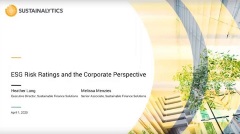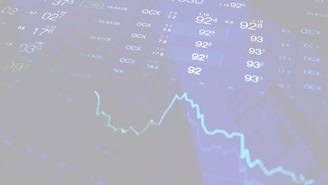Tackling the Climate Crisis: Mobilizing the Transition
As we mark the 50th Anniversary of Earth Day, we highlight the need for a collective effort in order to combat the impacts of climate change. In this blog, we explore the important role that investors play in mobilizing the transition to reduce emissions and how sustainable solutions can support this.
The Quest for Supply Chain Resilience: Where Business Sense and Thriving Rural Communities Meet
In this blog post we highlight the need for living income and living wages to build resilient supply chains and resistance to shocks such as the current COVID-19 pandemic. We explore the important role that investors play and how engagement efforts contribute to progress.
The Transition to Low-Carbon Steel Production
There is broad recognition that achieving international climate goals will require a significant reduction in greenhouse gas emissions from carbon-intensive sectors. The issuance of a Transition Bond may attract a more diverse pool of investors and help companies fund projects aimed at decarbonizing operations and supporting the progression to a low-carbon economy.
Coronavirus: Human Capital Management During and After the Pandemic
The coronavirus pandemic has been sudden and significant. The transition from business as usual to crisis response has meant that daily routines are no long routine and future planning is in a state of constant revision. We are learning new ways to source essential goods and connect with people. The same applies to companies. While truly exceptional, the pandemic illustrates the importance of proactive business planning and robust risk management systems, with companies’ ability to respond to shocks and adapt to changing circumstances being tested profoundly.
COVID-19 and Beyond: Using sustainable finance to build social resilience
As our global community continues to endure an altered way of life amidst the on-going COVID-19 outbreak, it is only natural to ask what each of our lives, professional and otherwise, will look like on the other side. Once children and teachers go back to school and workers return to their offices, will our society have done everything it could have to mitigate the social and economic impacts of this crisis and will we have built in resiliency against future system shocks?
CII Conference Reflections: Emerging Social Issues to Watch for in 2020
Following the Council of Institutional Investors Conference, we highlight two emerging social issues that were top of mind for active investors, Cyberthreats and Human Capital & the Future of Work, and discuss how partnering on engagement can drive long-term value.
Coronavirus and the Localization of Supply Chains
One of the lasting impacts of the COVID-19 pandemic will surely be a transformed understanding of supply chains. As we touched on in earlier posts[i] in our coronavirus blog mini-series, we expect the pandemic to catalyze a range of efforts by management teams to better understand the vulnerabilities of their supply chain. While executive teams closely track their tier 1 suppliers, many are unaware of the full scope of their global supply chain. Bain & Co recently estimated that up to 60% of executives have no knowledge of the items in their supply chain beyond the tier 1 level.[ii]
Pre-engagement study on labour rights in food supply chains
Labour rights issues in food supply chains are crucial matters to investors, both in terms of compliance with international human rights norms and national legislation, and from the material point of view of securing future supplies. With this background, GES, in collaboration with AP7, The Seventh Swedish National Pension Fund, conducted a pre-study to provide input for the development of a new engagement initiative.
5G and Industry 4.0: Enabling Efficient and Resilient Infrastructure
There is significant hype associated with the rollout of 5G networks, which is largely tied to the incredible data transfer speeds 5G capable networks can offer. However, speed is only part of the equation. Beyond speed, key attributes of 5G also include lower latency, reduced cost per gigabyte and larger connection volumes. 5G, unlike previous network technology, will be software-defined, enabling networking functionality to be flexible and adaptable over time.[i] As a result, 5G is anticipated to create a new digital backbone to power future infrastructure needs – a topic we explored in Sustainalytics’ report, 10 for 2020: Creating Impact Through Thematic Investing.
Responding to COVID-19 through Social Bonds
In the space of four months since the first cases of COVID-19 were diagnosed in Wuhan, China, the virus has spread to 178 countries globally. As a consequence, nearly 3 billion people around the world are living with varying degrees of lockdown imposed by governments aiming to slow the spread of the contagion.
ESG Risk Ratings and the Corporate Perspective
In this webinar, Sustainalytics’ Sustainable Finance Solutions team shared insights from our recently published Sustainable Finance Guide. They also discussed our ESG Risk Ratings, how it is being utilized for sustainable finance and beyond, and how companies are leveraging their ESG Ratings for capital raising activities, marketing and communications efforts and internal benchmarking processes.
Coronavirus: Flattening the Misinformation Curve
In February 2020, the WHO Director-General Tedros Ghebreyesus said misinformation about COVID-19 is just as dangerous as the virus itself. “We are not just fighting an epidemic; we are fighting an ‘infodemic.’ Fake news spreads faster and more easily than the virus and is just as dangerous.”[i]
EU Sustainable Finance Action Plan: Final Taxonomy Report Published and Other Developments
The highly anticipated final report by the TEG (Technical Expert Group) on the EU Taxonomy was published in early March, followed by a stakeholder information session. You can read our blog post on last fall’s developments here.
Coal Investments: Up in Smoke?
Growing public concern over climate change is pushing investors to increasingly assess how their portfolios are pivoting to a low carbon economy. Because of its large carbon footprint, the coal industry is a prime target of environmental activism and divestment campaigns, and it is becoming the investable hot potato few want to hold.
German Corporate Governance Standards Overhauled
The legal and regulatory foundations of Germany’s corporate governance system are being overhauled in the form of far-reaching changes to the German Stock Corporations Act (AktG) and the German Corporate Governance Code (Kodex). As a result, institutional investors should expect enhanced transparency from German issuers, as well as stronger rights enabling them to effectively exercise their stewardship responsibilities. The reform reflects both the transposition of the EU Shareholder Rights Directive II (SRD II) into domestic law and a corresponding Kodex revamp, both aiming to incorporate governance features that are more typically associated with Anglophone jurisdictions.
The ESG Risk Ratings: Potential Applications for Investors
With our third ESG Risk Ratings white paper, we explore how investors could potentially apply the ESG Risk Ratings to their investment processes. Below are some key takeaways from the white paper. To learn more, register for our regional webinar using the buttons at the bottom of the page.







.tmb-small.png?Culture=en&sfvrsn=2b395014_2)











